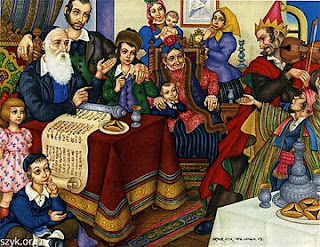As we mark a second Purim at war with Hamas and Hezbollah, writes our member Rabbi Paul Bloom, we are once again confronted with the age-old struggle against hatred and oppression. The Purim narrative, with its cast of characters—Haman, Achashverosh, and the resilient Jewish people—offers profound insights into our response to the barbarism of Hamas and Iran.
The Plot Unfolds: Haman’s
Hatred and Achashverosh’s Dilemma
Haman, driven by irrational animosity, sought to annihilate the Jewish people. His malevolence knew no bounds; he envisioned a cruel and humiliating end for an entire community. Yet Achashverosh, the Persian king, hesitated. He rejected Haman’s brutal plan, opting for a more restrained approach. The Talmud (Megillah 14a) highlights Achashverosh’s sensitivity, noting that while he allowed Haman's decree, he was not as bloodthirsty himself.
This
early instance of anti-Semitism echoes through history. Today, anti-Semitism
persists in politics, international forums, sports, entertainment, education,
and even within our own governments and social circles. Worse, it appears to be
intensifying. How do we respond to this rising tide of hatred?
Drawing Strength from Our
Identity
The
Jews of Persia faced annihilation, yet they did not retreat into anonymity.
Instead, they embraced their Jewish identity more fervently. In the face of
irrational hate, they remained steadfast in their faith and traditions. Their
response teaches us a vital lesson: our identity is not defined by external
forces but by the blessings of happiness, family, love, life, and the moral
compass bestowed upon us by the Torah.
This
phenomenon is unfolding in Israel today. We hear stories of hostages and their
families rediscovering their faith—saying Shema for the first time, lighting
Shabbat candles, donning Tefillin and Tzitzit, and celebrating Shabbat and Yom
Tov. This war has ignited a Jewish awakening.
We
do not combat emptiness by becoming more empty. Instead, we stand proudly and
defiantly, trusting in Hashem and remaining loyal to our people. Our resilience
lies not in assimilation but in unwavering commitment.
Beyond Identity: Political and
Military Measures
Yet
the Jews of Persia did not rely solely on faith. They took practical steps to
protect themselves. Similarly, in our complex world, we must blend hope with
action. Here are some modern parallels:
● Advocacy and Education: We combat ignorance with knowledge.
Educating both Jews and non-Jews about our history, culture, and contributions
helps dispel misconceptions. Advocacy organizations play a crucial role in
countering anti-Semitism.
● Community Unity: Like the Jews of Persia, we must stand
together. Our strength lies in unity. When anti-Semitism rears its head, we
must respond as a cohesive community, amplifying our voices.
● Political Engagement: We engage in the political arena,
advocating for policies that promote tolerance, inclusivity, and justice. Our
votes matter; they shape the world we leave for future generations.
● Military Response: Just as the Jews of Persia protected
themselves militarily, the IDF—guided by Hashem—defends the Jews of Israel. The
bravery and morality of the IDF are unparalleled. We have witnessed open
miracles—from protection against hundreds of missiles to bombs failing to
detonate in crowded areas.
The IDF: Defending Our
Existence with Unprecedented Ethics
The
Israel Defense Forces (IDF) embody the fusion of faith and action. Their
mission extends beyond military defense; they uphold ethical warfare even when
facing a barbaric enemy. Colonel Richard Kemp, former Commander of British
Forces in Afghanistan, has stated that the IDF surpasses other armies in
safeguarding civilian rights during combat.
Unparalleled Measures for Civilian Safety
- Advanced Warnings: The IDF takes extraordinary steps to warn Gaza civilians before striking. They drop millions of leaflets, broadcast radio messages, send texts, and make tens of thousands of phone calls. Imagine: Israeli soldiers personally calling Gazans, urging them to evacuate. No army in history has ever directly informed its enemy where bombs will fall.
- Risking Their Own Safety: IDF missions that could have neutralized Hamas military capabilities were often aborted to prevent civilian casualties. This self-imposed restraint increases risks for Israeli soldiers and citizens but underscores the IDF’s commitment to preserving innocent lives.
- Combating Misinformation: Despite these efforts, antisemites accuse Israel of genocide. Yet the truth is clear—the IDF fights not only to defend Israel but to uphold humanity.
- Feeding the Enemy: No other army in history has provided food, water, and fuel to its enemy—especially one actively seeking its destruction.
Drawing Inspiration from Haman
and Purim
Haman
was consumed by an insatiable void, an emptiness that ultimately led to his
downfall. Yet his malevolence gave birth to Purim—a holiday where Jewish
children joyfully drown out his name with groggers. Why? Because we refuse to
be swallowed by darkness. Instead, we fight evil with light, filling voids with
hope.
Our Miraculous Victory
We
look forward to soon celebrating another miraculous victory—the defeat of Hamas
and Iranian aggression, along with the safe return of our hostages. This
triumph will not only mark the protection of the Jewish people but serve as a
victory for the entire civilized world. It will symbolize our resilience
against cruelty and barbarism.
Conclusion: A Call to Action
As we honor Purim, let us remember that our fight extends beyond borders. The IDF’s mission echoes through history: to protect lives, uphold justice, and bring light to a world often shrouded in darkness. May we draw inspiration from our ancient past and apply it to our present reality. May we remain unyielding in our identity, compassionate in our actions, and resolute in our pursuit of a world free from barbarism.








